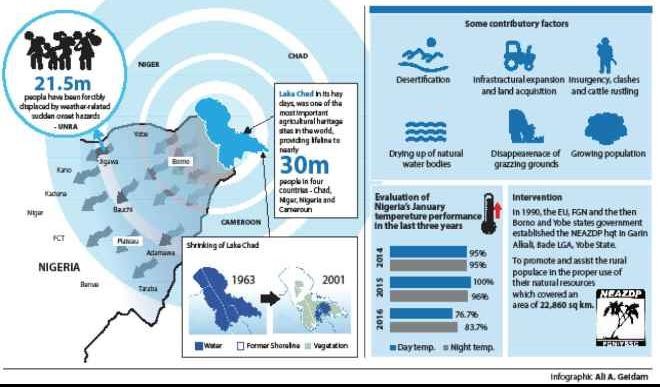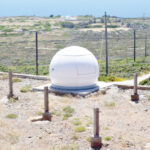
Listening to a 63-year-old man force back sobs as he narrates his experience losing the chunk of his biggest life’s investment is not a situation to experience more than once. It is difficult to know whether to offer words of comfort, assurances or simply be quiet.
It took two days of back and forth conversations, to get Malam Madaki Ya’u from Yobe State, who is currently visiting relatives in Dawaki, Abuja, composed enough to tell his story.
“I would go to bed praying that the drop in temperature at night would help alleviate the discomfort of the animals and that by morning they would have recovered a little.
“But for one week, all I woke up to were my dead animals,” Ya’u said, using sighs, hisses and the words, “my sister, it wasn’t easy,”to suppress the subtle sobs that caused him to suddenly stutter.
“They died in twos, sometimes fours, or threes and at other times, one. I didn’t think I would survive it,” he added.
Ya’u lost over 50 cattle from his herd in 2016. In monetary terms this equals about N8 million.
“It was so hot last year and grazing was difficult. They took ill and I was helpless. I didn’t have the money to pay for any medical care. I treated them the traditional way I had seen my father and grandfather do, to tend our sick cows. But it didn’t work. This time, the heat was more than back then. I watched them die from the illnesses and/or from hunger.”
Alheri’s team harvesting what was left of their rice farm after herds had had their fill
There was another odd against Ya’u.
“Even in the harmattan when the cattle would usually feed on dry grass, bush burning made this impossible,” he said. The grasses, down to their roots are burnt off.
With the harmattan approaching this year, the sleepless nights have begun for him, as he worries where he will graze his animals.
Muhammed Yuguda Abubakar and his family are not likely to return to Epogi community of Katcha Local Government Area, Niger State, where they had settled for about 17 years.
A violent conflict over farmland, on which Abubakar’s cows also graze, resulted in 21deaths in May 2017. The incident displaced hundreds of natives, while Abubakar, who is believed to be at the heart of the conflict, fled the community with his family.
On May 13, when Muslim faithful finished observing their early morning prayers, Fulani militias allegedly hired by Abubakar attacked the community.
Some of them were dragged out of the mosque and slaughtered in full glare of family members. At the centre of the unfortunate crisis was a flood plain owned by members of the community, which was also a grazing spot for Abubakar’s animals.
The predominantly fishing community was said to have temporarily allocated the disputed flood plain to Abubakar, who was a resident then, until they had need for it.
In the wet season, Abubakar commuted between Agaie local government, where part of his family resided, and would return to Epogi in the dry season.
With the Niger State dry season farming initiative, the community decided to use part of the land for farming, an idea Abubakar vehemently resisted. The situation was said to have resulted in serious disagreements, necessitating intervention by the Etsu Nupe, Alhaji Yahaya Abubakar, who prevailed on the community to allocate an alternative land to Abubakar. He refused this, as well as propositions that he waited until harvest season to make way for him.
The attack was said to have targeted all who directly or indirectly opposed his views.
Since setting off from the Borno end of the receding Lake Chad, he has settled in two other locations. But clashes similar to Epogi’s have forced him to move. In all this, he has lost quite a number of herds and four family members.
Alheri Yusuf, 26, of Doma, Nasarawa State, went back to farming in 2009 after university, with specific interest in cultivating maize, sorghum and groundnut. In 2014, she added rice and now grows only maize and rice.
But that year, the invasion of armed herders and their cattle on her farm, deprived her of harvesting a single crop. In addition, it was during one of these clashes that her father was killed, as he tried to scare them off her farm.
The tears that freely flow down her cheeks, three years after, indicate how very sore a topic this still is for the mother of one whose N122,000 capital went with the wind.
A visit to her farm during harvest in the second week of October, revealed how dire the situation is for her.
She constantly bellowed in Hausa to the rest of her team, “Please be careful. Stay away from the parts where they are. Let’s harvest the other side.”
“They” in this context were the pastoralists and their herds who were freely grazing off her rice farm.
Her movements were swift, angry and her face doubled in size by frustration. But Alheri mustered all her might to restrain herself from an outburst. The one thing that successfully kept her in check was her vivid recollection of her late father’s severely macheted body.
While these respondents all live in different locations and have different experiences, the genesis of their now distorted lives is a common denominator that connects them.
Women and children fleeing Epogi by boat after the clash
Grazing grounds and natural water bodies have been dried up and degraded by drought and desertification. Also, growing populations, infrastructure expansion and land acquisition by large scale farmers are obstructing grazing routes. Insurgency and cattle rustling are other factors that have contributed to the forced exodus of herders and farmers to other parts of the country.
As at 1960, Nigeria had 415 grazing reserves, which were established by the northern regional government with only 114 formally documented or demarcated. There is no legislative backing to these agreements to guarantee their exclusive use or any preventive measures against encroachment.
An earlier visit to Paikon Kore, a community of about 2, 000 inhabitants in Gwagwalada Area Council of the FCT, revealed that its only natural water source, River Iku, is in the path of one of these reserves.
Children playing, women doing laundry and dishes, as commercial motorcycle riders wash their bikes in the water, cause ripples that slap the riverbank, taking some of the cow dung back into the already dung coloured and infested water.
Women and children in this community, have a history of suffering from schistosomiasis also called snail fever or bilharzia, an illness which affects their urinary tract, liver and other organs causing them to have bloody stool and urine among other manifestations.
The World Health Organization considers the disease which is spread by contact with fresh water contaminated by parasitic flatworms – schistosomes – to be the second-most socioeconomically devastating parasitic disease, after malaria.
Organization considers the disease which is spread by contact with fresh water contaminated by parasitic flatworms – schistosomes – to be the second-most socioeconomically devastating parasitic disease, after malaria.
Abubakar said drought and the receding Lake Chad – which they once relied on for their survival and that of their herds – have displaced thousands of farmers and herders like him in the Northeast for over 20 years.
Lake Chad is located west of Chad and Nigeria’s Northeast. It used to be Africa’s largest water reservoir in the Sahel region, covering an area of about 26,000 square kilometres.
The natural endowment, in its hay days, was one of the most important agricultural heritage sites in the world, providing lifeline to nearly 30 million people in four countries – Chad, Niger, Nigeria and Cameroun.
A study by University of Wisconsin-Madison researchers, working with NASA’s Earth Observing System program, revealed that the lake is now 1/20th the size it was 35 years ago.
They attribute the dramatic shrink to climate change and human demand for water. The region, which has suffered from an increasingly dry climate has also suffered a significant decline in rainfall since the early 1960s.
Worried by the development, governments of the affected Borno and Yobe states, and the federal government in collaboration with the European Union (EU), embarked on some interventions.
In 1990, they established the North East Arid Zone Development Programme headquartered in Garin Alkali, Bade Local Government Area of Yobe State.
The aim was to promote and assist the rural populace in the proper use of their 22,860 sq km water resources.
They were successful with small irrigation packages, animal fattening programmes, small ruminant breeding, sand dunes fixation, shelterbelt, village protection, conservation of rainwater at strategic places for livestock rearing and distribution of seedlings in the affected communities. But the EU withdrew its support in 1995 and the federal government in 2006.
This posed great challenge towards the sustenance of the programme because only skeletal services were being offered.
As scientists predict an increase in people displacement, Prof. David Okali, board chairman of the Nigerian Environmental Study Action Team, said people being sufficiently aware of the issues and the provocative factors, will put them in a position to address it.
Practicing what he preaches, Okali and his team embarked on a five-year community awareness project on climate change in 15 communities across Nigeria’s economic zone. The outcome of this project is being used by the Ministry of Agriculture, which built on it to prepare resilient urban agricultural projects.
While all this is going on, the conditions continue to draw the likes of Abubakar and Alheri into a field of conflict as they each struggle to survive and save what is most important to them.




